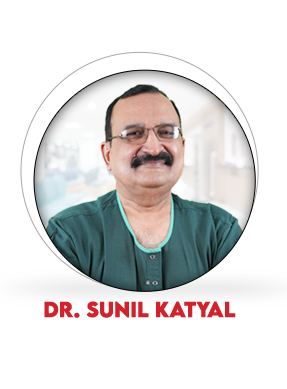Palliative care is specialized medical care for people living with a serious illness. Its main focus is to provide relief to the patient from the symptoms and stress of the illness.
Palliative care is appropriate for individuals with serious illnesses across the age spectrum and can be provided as the main goal of care or in tandem with curative treatment.
According to Dr. Sunil Katyal, Deputy Director, SPS Hospitals, “Palliative is appropriate at any age and at any stage in a serious illness, and it can be provided along with curative treatment.”
SPS Hospitals Ludhiana provides a comprehensive facility of palliative care for patients living with a serious illness, such as cancer or heart failure with trained medical professionals to provide medical, social, emotional, and practical support.

When to consider palliative care?
Palliative care can be asked at any time when one is suffering from serious or life threatening illness. There’s a common misconception that palliative care means end of life care and many patients delay this treatment till their illness is at a later or terminal stage. In fact, palliative care is most effective when started early, closer to diagnosis and early use of palliative care, improves both quality of life and overall survival. Early palliative care is also associated with a lower risk of depression in people newly diagnosed with advanced cancer.
What are the benefits of palliative care?
Palliative care is focused on improving the overall wellness of people with serious illnesses. It addresses both the symptoms and the stress of living with a chronic illness. Palliative care not only helps in alleviating symptoms but also improves understanding of illness. It assists in understanding treatment modalities, making decisions, and coordinating care. It may also involve support for caregivers since it’s based on individual needs. It also helps in identifying and accessing additional resources to provide support.
Who provides this type of care?
Palliative care is provided by a specially-trained team of doctors, nurses, specialists and others like counsellor, psychologists, dietician, social worker etc who work together with a patient’s other doctors to provide an extra layer of support. This team works to ensure your holistic (all-around) well-being over the course of your illness.
What is the difference between palliative care and home health care?
Palliative care is a form of home health care in which patients face chronic or quality of life-limiting illnesses, and focuses on the relief of symptoms, pain and stress. Home health services help you get better from an illness or injury, regain your independence, and become as self-sufficient as possible.
Is palliative care the same as end of life?
Palliative care is a form of home health care in which patients face chronic or quality of life-limiting illnesses, and focuses on the relief of symptoms, pain and stress. Home health services help you get better from an illness or injury, regain your independence, and become as self-sufficient as possible.
What is the difference between palliative care and home health care?
Having palliative care doesn’t necessarily mean that you’re likely to die soon – some people have palliative care for years. End of life care offers treatment and support for people who are near the end of their life.
What is the goal of palliative care?
- To improve the quality of life in people experiencing serious or terminal illness
- Symptom management support.
- To reduce risk of depression
- To longer survival
- To provide support in making decisions
- To provide support for family members and caregivers
- To improve caregiver satisfaction

Our Expert
At present, he is Secretary IMA Punjab and Trustee, Indian college of Anesthesiology (ICA) formally, he held the position of
- Vice President – Indian Society of Anesthesiologist (ISA) National (2018-2019)
- Chairman – Disciplinary committee, Punjab Medical Council (PMC) – 2013-15 during the tenure when he was member of PMC (2013-2017)
- Chairman – Ethical Committee IMA Punjab (2015)
- Organizing Secretary of National conference of I conference was attended by about 4000 delegates from 15 countries.
In addition, he had been examiner of various university across India as well as assessor & examiner for National Board of Examination (NBE).
